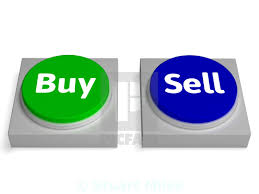 Business is the activity of making one’s living or making money by producing or buying and selling products (such as goods and services). Simply put, it is “any activity or enterprise entered into for profit. It does not mean it is a company, a corporation, partnership, or have any such formal organization, but it can range from a street peddler to General Motors.”
Business is the activity of making one’s living or making money by producing or buying and selling products (such as goods and services). Simply put, it is “any activity or enterprise entered into for profit. It does not mean it is a company, a corporation, partnership, or have any such formal organization, but it can range from a street peddler to General Motors.”
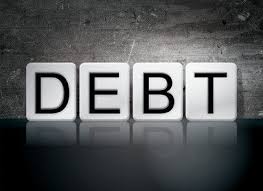 Having a business name does not separate the business entity from the owner, which means that the owner of the business is responsible and liable for debts incurred by the business. If the business acquires debts, the creditors can go after the owner’s personal possessions. A business structure does not allow for corporate tax rates. The proprietor is personally taxed on all income from the business.
Having a business name does not separate the business entity from the owner, which means that the owner of the business is responsible and liable for debts incurred by the business. If the business acquires debts, the creditors can go after the owner’s personal possessions. A business structure does not allow for corporate tax rates. The proprietor is personally taxed on all income from the business.
The term is also often used colloquially (but not by lawyers or by public officials) to refer to a company. A company, on the other hand, is a separate legal entity and provides for limited liability, as well as corporate tax rates. A company structure is more complicated and expensive to set up, but offers more protection and benefits for the owner.
This post contains affiliate links, which mean if you use these links to purchase an item or service I receive a commission at no extra cost to you. Visit my Affiliate Disclaimer page here.
Small businesses
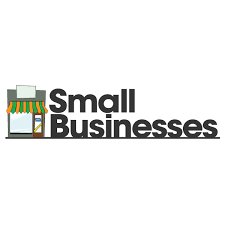 Small businesses are privately owned corporations, partnerships, or sole proprietorships that have fewer employees and/or less annual revenue than a regular-sized business or corporation. Businesses are defined as “small” in terms of being able to apply for government support and qualify for preferential tax policy varies depending on the country and industry. Small businesses range from fifteen employees under the Australian Fair Work Act 2009, fifty employees according to the definition used by the European Union, and fewer than five hundred employees to qualify for many U.S. Small Business Administration programs. While small businesses can also be classified according to other methods, such as annual revenues, shipments, sales, assets, or by annual gross or net revenue or net profits, the number of employees is one of the most widely used measures.
Small businesses are privately owned corporations, partnerships, or sole proprietorships that have fewer employees and/or less annual revenue than a regular-sized business or corporation. Businesses are defined as “small” in terms of being able to apply for government support and qualify for preferential tax policy varies depending on the country and industry. Small businesses range from fifteen employees under the Australian Fair Work Act 2009, fifty employees according to the definition used by the European Union, and fewer than five hundred employees to qualify for many U.S. Small Business Administration programs. While small businesses can also be classified according to other methods, such as annual revenues, shipments, sales, assets, or by annual gross or net revenue or net profits, the number of employees is one of the most widely used measures.
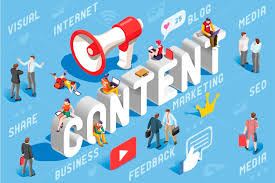 Small businesses in many countries include service or retail operations such as convenience stores, small grocery stores, bakeries or delicatessens, hairdressers or tradespeople (e.g., carpenters, electricians), restaurants, guest houses, photographers, very small-scale manufacturing, and Internet-related businesses such as web design and computer programming. Some professionals operate as small businesses, such as lawyers, accountants, dentists, and medical doctors (although these professionals can also work for large organizations or companies). Small businesses vary a great deal in terms of size, revenues, and regulatory authorization, both within a country and from country to country. Some small businesses, such as a home accounting business, may only require a business license. On the other hand, other small businesses, such as day cares, retirement homes, and restaurants serving liquor are more heavily regulated and may require inspection and certification from various government authorities.
Small businesses in many countries include service or retail operations such as convenience stores, small grocery stores, bakeries or delicatessens, hairdressers or tradespeople (e.g., carpenters, electricians), restaurants, guest houses, photographers, very small-scale manufacturing, and Internet-related businesses such as web design and computer programming. Some professionals operate as small businesses, such as lawyers, accountants, dentists, and medical doctors (although these professionals can also work for large organizations or companies). Small businesses vary a great deal in terms of size, revenues, and regulatory authorization, both within a country and from country to country. Some small businesses, such as a home accounting business, may only require a business license. On the other hand, other small businesses, such as day cares, retirement homes, and restaurants serving liquor are more heavily regulated and may require inspection and certification from various government authorities.
Outline of business
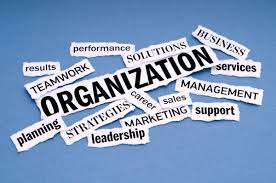 Business – organization of one or more individuals, engaged in the trade of goods, services, or both to consumers, and the activity of such organizations, also known as “doing business”.
Business – organization of one or more individuals, engaged in the trade of goods, services, or both to consumers, and the activity of such organizations, also known as “doing business”.
- Organization – An organization or organisation is an entity, such as a company, an institution, or an association, comprising one or more people and having a particular purpose.
- Goods – In economics, goods are items that satisfy human wants and provide utility, for example, to a consumer making a purchase of a
 satisfying product. A common distinction is made between goods which are transferable, and services, which are not transferable.A good may be a consumable item that is useful to people but scarce in relation to its demand, so that human effort is required to obtain it. In contrast, free goods, such as air, are naturally in abundant supply and need no conscious effort to obtain them. Private goods are things owned by people, such as televisions, living room furniture, wallets, cellular telephones, almost anything owned or used on a daily basis that is not food related.A consumer good or “final good” is any item that is ultimately consumed, rather than used in the production of another good. For example, a microwave oven or a bicycle that is sold to a consumer is a final good or consumer good, but the components that are sold to be used in those goods are intermediate goods. For example, textiles or transistors can be used to make some further goods.
satisfying product. A common distinction is made between goods which are transferable, and services, which are not transferable.A good may be a consumable item that is useful to people but scarce in relation to its demand, so that human effort is required to obtain it. In contrast, free goods, such as air, are naturally in abundant supply and need no conscious effort to obtain them. Private goods are things owned by people, such as televisions, living room furniture, wallets, cellular telephones, almost anything owned or used on a daily basis that is not food related.A consumer good or “final good” is any item that is ultimately consumed, rather than used in the production of another good. For example, a microwave oven or a bicycle that is sold to a consumer is a final good or consumer good, but the components that are sold to be used in those goods are intermediate goods. For example, textiles or transistors can be used to make some further goods.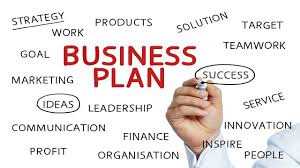 Commercial goods are construed as tangible products that are manufactured and then made available for supply to be used in an industry of commerce. Commercial goods could be tractors, commercial vehicles, mobile structures, airplanes and even roofing materials. Commercial and personal goods as categories are very broad and cover almost everything a person sees from the time they wake up in their home, on their commute to work to their arrival at the workplace.Commodities may be used as a synonym for economic goods but often refer to marketable raw materials and primary products.Although common goods are tangible, certain classes of goods, such as information, only take intangible forms. For example, among other goods an apple is a tangible object, while news belongs to an intangible class of
Commercial goods are construed as tangible products that are manufactured and then made available for supply to be used in an industry of commerce. Commercial goods could be tractors, commercial vehicles, mobile structures, airplanes and even roofing materials. Commercial and personal goods as categories are very broad and cover almost everything a person sees from the time they wake up in their home, on their commute to work to their arrival at the workplace.Commodities may be used as a synonym for economic goods but often refer to marketable raw materials and primary products.Although common goods are tangible, certain classes of goods, such as information, only take intangible forms. For example, among other goods an apple is a tangible object, while news belongs to an intangible class of 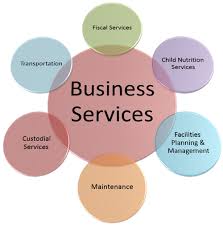 goods and can be perceived only by means of an instrument such as print or television.
goods and can be perceived only by means of an instrument such as print or television. - Service – In economics, a service is a transaction in which no physical goods are transferred from the seller to the buyer. The benefits of such a service are held to be demonstrated by the buyer’s willingness to make the exchange. Public services are those that society (nation state, fiscal union or region) as a whole pays for. Using resources, skill, ingenuity, and experience, service providers benefit service consumers. Service is intangible in nature.In a narrower sense, service refers to quality of customer service: the measured appropriateness of assistance and support provided to a customer.
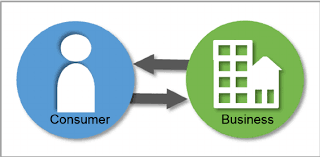 This particular usage occurs frequently in retailing.
This particular usage occurs frequently in retailing. - Consumer – A consumer is a person or a group who intends to order, orders, or uses purchased goods, products, or services primarily for personal, social, family, household and similar needs, not directly related to entrepreneurial or business activities.
Business development
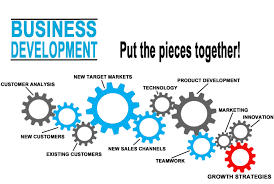 Business development entails tasks and processes to develop and implement growth opportunities within and between organizations. It is a subset of the fields of business, commerce and organizational theory. Business development is the creation of long-term value for an organization from customers, markets, and relationships. Business development can be taken to mean any activity by either a small or large organization, non-profit or for-profit enterprise which serves the purpose of ‘developing’ the business in some way. In addition, business development activities can be done internally or externally by a business development consultant. External business development can be facilitated through Planning Systems, which are put in place by governments to help small businesses. In addition, reputation building has also proven to help facilitate business development.
Business development entails tasks and processes to develop and implement growth opportunities within and between organizations. It is a subset of the fields of business, commerce and organizational theory. Business development is the creation of long-term value for an organization from customers, markets, and relationships. Business development can be taken to mean any activity by either a small or large organization, non-profit or for-profit enterprise which serves the purpose of ‘developing’ the business in some way. In addition, business development activities can be done internally or externally by a business development consultant. External business development can be facilitated through Planning Systems, which are put in place by governments to help small businesses. In addition, reputation building has also proven to help facilitate business development.
Business person
 A businessperson, businessman or businesswoman is a person involved in the business sector – in particular someone undertaking activities (commercial or industrial) for the purpose of generating cash flow, sales, and revenue by utilizing a combination of human, financial, intellectual and physical capital with a view to fueling economic development and growth. An entrepreneur is a person who sets up a business or businesses.
A businessperson, businessman or businesswoman is a person involved in the business sector – in particular someone undertaking activities (commercial or industrial) for the purpose of generating cash flow, sales, and revenue by utilizing a combination of human, financial, intellectual and physical capital with a view to fueling economic development and growth. An entrepreneur is a person who sets up a business or businesses.
The term “businessperson” may refer to a founder, owner, or majority shareholder of a commercial enterprise; or it can characterize a high-level executive who does the everyday running and management of a company even if that executive is not the owner. The term may sometimes refer to someone who is involved in an upper-level management role in a corporation, company, enterprise, firm, organization, or agency.
Business idea
A business idea is a concept that can be used for financial gain that is usually centered on a product or service that can be offered for money. An idea is the base of the pyramid when it comes to the business as a whole.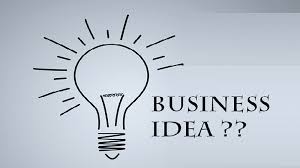
The characteristics of a promising business idea are:
- Innovative
- Unique
- Problem solving
- Profitable
A business idea is often linked to its creator who needs to identify the business’ value proposition in order to launch to market and establish competitive advantage.
Business model
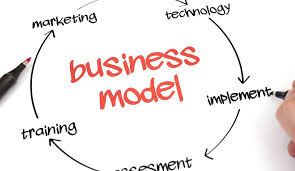 A business model describes the rationale of how an organization creates, delivers, and captures value, in economic, social, cultural or other contexts. The process of business model construction and modification is also called business model innovation and forms a part of business strategy.
A business model describes the rationale of how an organization creates, delivers, and captures value, in economic, social, cultural or other contexts. The process of business model construction and modification is also called business model innovation and forms a part of business strategy.
In theory and practice, the term business model is used for a broad range of informal and formal descriptions to represent core aspects of a business, including purpose, business process, target customers, offerings, strategies, infrastructure, organizational structures, sourcing, trading practices, and operational processes and policies including culture.
Entrepreneurship
 Entrepreneurship is the creation or extraction of value. With this definition, entrepreneurship is viewed as change, which may include other values than simply economic ones.
Entrepreneurship is the creation or extraction of value. With this definition, entrepreneurship is viewed as change, which may include other values than simply economic ones.
Some more narrow definitions has described entrepreneurship as the process of designing, launching and running a new business, which is often initially a small business, or as the “capacity and willingness to develop, organize and manage a business venture along with any of its risks to make a profit.” The people who create these businesses are often referred to as entrepreneurs. While definitions of entrepreneurship typically focus on the launching and running of businesses, due to the high risks involved in launching a start-up, a significant proportion of start-up businesses have to close due to “lack of funding, bad business decisions, an economic crisis, lack of market demand, or a combination of all of these.”
 A somewhat broader definition of the term is sometimes used, especially in the field of economics. In this usage, an entrepreneur is an entity which has the ability to find and act upon opportunities to translate inventions or technologies into products and services: “The entrepreneur is able to recognize the commercial potential of the invention and organize the capital, talent, and other resources that turn an invention into a commercially viable innovation.” In this sense, the term “entrepreneurship” also captures innovative activities on the part of established firms, in addition to similar activities on the part of new businesses. Yet, the definition is still narrow in the sense that it still focuses on the creation of economic (commercial) value.
A somewhat broader definition of the term is sometimes used, especially in the field of economics. In this usage, an entrepreneur is an entity which has the ability to find and act upon opportunities to translate inventions or technologies into products and services: “The entrepreneur is able to recognize the commercial potential of the invention and organize the capital, talent, and other resources that turn an invention into a commercially viable innovation.” In this sense, the term “entrepreneurship” also captures innovative activities on the part of established firms, in addition to similar activities on the part of new businesses. Yet, the definition is still narrow in the sense that it still focuses on the creation of economic (commercial) value.
I hope that you have really enjoyed this post,
Please Leave All Comments in the Comment Box Below ↓

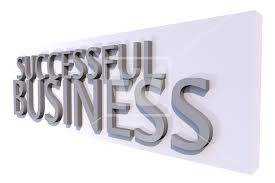









Business is probably the most studied subject on earth and so with it should come much more posts like this which bring business back to life from its feet.
I myself needed help looking at what business is made up of and who runs it and what it takes to become someone who lives and breaths co-ordination inside of a business .
I especially loved your inside business paragraph.
Very helpful, thank you!
Hello,
Thank you for considering this an insightful post that brings business back to life from its feet, and I am very pleased that it has been a great help to you as well. It is with great honor and humbleness, that I am feeling deep in my soul to be of any assistance in providing information which will assist in the prosperity of your business.
It pleases me to learn that you have enjoyed reading and learning from this Successful Business article. It is my hope that you bookmark this article and share it with your friends.
Thank you again for taking the time to read, comment on, and for considering it an informative article.
Blessings and Cheers To You My Friend!
Many thanks to you for sharing with us a beautiful and informative article.
The main content of this article is about a successful business. Honestly, the business cannot be an alternative to reach your desired goal. The present is the age of online reliance so you can achieve success by doing online business if you want which is explained here by the author. That’s why I started an online business and my online business is very profitable, especially during this lock-down.
Finally, I have read your article and enjoyed it. I want to share them on my Facebook group so that everyone can learn about these tips and start their own business.
Good day,
You are most certainly welcome for the sharing of Successful Business, which you consider to be such a beautiful and informative article. I am most grateful for your opinion about the information contained in this article, as well as, other articles that I have created.
Have A Blessed Day!
I wish that a lot if people can actually get to see this and read it well before diving into business creation or starting these days. It never gets easier and the road doesn’t not get easier.
Actually for all you have shared here, I can only say that for everything you have shared, you have helped to prevent a lot more people who access this from just quitting halfway into developing and all.
Thank you!
Good evening,
Thank you so much for reading, commenting and enjoying this page. I agree with your comment whole heartedly!
I would also like for you to share this article with your close relatives and friends so that they can overcome the restrictions of Successful Business in their lives.
You are most certainly welcome for the reminder.
Many Blessing Regards To You My Friend!
To succeed in business today, One needs to flexible and have good planning and organization skills.
The problem we have in this generation is the fact that many business owners just think they would just open doors and turn on the computers and money starts flowing in, but it doesn’t happen that way. I know it would take a lot of work, as well as time.
Good day,
Thank you for committing a portion of your time to read, comment, and considering this page to be useful. I really appreciate your remarks and it definitely pleases me to learn that this page is considered real inspiration to you.
I Wish You Lots of Blessings on Your Journey!
As a newbie in the online market place I found this article very helpful and also enjoyed it so much,
I even had to save it so I can refer to it later. I really loved this and It shows the importance of owning a website for your business as well
Hello,
Thank you so much for your comment about this article. I am very pleased that you have found it helpful.
Much Success In Your Journey,
Jerry